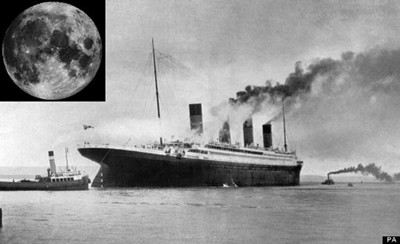(单词翻译:单击)

Scientists have found an unexpected culprit for the Titanic's sinking: the moon, Reuters reported.
据路透社报道,科学家发现了泰坦尼克号沉没的意外之因:月球。
Greenland icebergs of the type that the Titanic struck generally become stuck in the shallow waters off Labrador and Newfoundland, and cannot resume moving southward until they have melted enough to re-float or a high tide frees them, Donald Olson from Texas State University said.
来自德克萨斯州立大学的唐纳德·奥尔森表示,泰坦尼克号撞上的那种格陵兰岛冰川,一般都是搁浅在拉布拉多和纽芬兰旁的浅水中,它们直到融化到能漂浮,或被大潮冲走才能重新开始移动。
Olson said a "once-in-many-lifetimes" event occurred on Jan. 4, 1912, when the moon and sun lined up in such a way that their gravitational pulls enhanced each other. At the same time, the moon's closest approach to earth that January was the closest in 1,400 years.
奥尔森说,千年一遇的现象于1912年1月4日发生:月球和太阳排得非常直,两者间的吸引力使得各自的引力增强。同时,月球在那年的1月份距离地球也是1400年来最近的。
The high tide caused by the bizarre combination of astronomical events would have been enough to dislodge icebergs from Greenland in January 1912 and give them enough buoyancy to reach the shipping lanes by April, Olson said.
奥尔森你说,1912年1月份这些奇异的天文现象在一起引起了大潮,大潮足以使冰川从格陵兰岛脱落,并给它们足够的浮力使它们4月前漂到航道。


